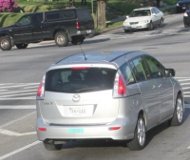12/17/2012
Maryland: Speed Camera Company Admits 5.2 Percent Error RatesXerox admits several of its cameras in Baltimore, Maryland issued tickets to innocent motorists 5.2 percent of the time.

Over the past two decades, advocates have argued the main advantage of a speed camera is that the machines never lies. Most states codify this belief with a legal presumption that the automated citation is accurate and it is up to the defendant to prove otherwise. In Baltimore, Maryland last week a leading speed camera vendor made the unprecedented admission that the technology frequently lies, but obvious examples of false readings slipped through the process due to "human error."
Photocopy giant Xerox, which recently acquired Affiliated Computer Services, has been rocked by accusations that motorists who diligently observed the speed limit were nonetheless receiving photo radar tickets in the mail. Xerox had no choice but to conduct a review under heavy pressure from local politicians.
"In a limited number of cases, radar effects can occur," Xerox regional program manager Ryan Nicolas wrote in a December 11 letter to the city. "Radar effects are caused by reflection, refraction and absorption, and can be identified and eliminated during the review process. Based on a review of the images alone, we identified five locations that demonstrated higher incidents of radar effects than is typical and need further investigation to determine the root cause. All of these errors are identifiable by reviewing the images, which means they can be addressed as exceptions during the review process."
Though Xerox still does not know for certain the cause of the bogus readings at the Cold Spring Lane and Franklin Street locations, the company proposes to continue issuing citations. It has trained employees to weed out obviously erroneous citations that might cause further embarrassment to the program. Xerox drew its conclusions after looking at a small slice of the citations it issued in a program that last year mailed out 904,587 red light camera and speed camera tickets worth $36,183,480.
"As part of the review, Xerox examined over seven thousand issued citations for radar effects that may have resulted in erroneous speed recordings," Nicolas wrote. "Five of the eighty-three sites revealed some environmental issues causing an unusually high rate of occurrence of radar effects, typically attributed to the presence of high-profile vehicles in the field of view. A more extensive review of these locations showed incidence of radar effects that were not identified in processing of 5.2 percent."
The problems are not confined to one city or one particular vendor. Speed cameras operated by Optotraffic have issued bogus tickets in Forest Heights. Last month, the state's legislative auditor blasted the State Highway Administration for the lax administration of testing requirements for speed cameras (view report).
Based on the experience in other countries, the troubles in Maryland could force the refund of millions of dollars worth of citations. Last year, Edmonton, Canada admitted at least twenty-six bogus tickets were issued in a roughly two-year period. Because the city was unable to guarantee the accuracy of the speed readings, it had no choice but to cancel 141,729 tickets worth $17 million (refunds for issued citations amounted to $12.3 million).
In July 2003, a speed camera in Victoria, Australia accused motorist Vanessa Bridges' 1975 Datsun 120Y of driving at 98 MPH, setting off a chain reaction of events that ultimately cost the state government A$26 million in refunds. Even after the thirty-year-old Datsun was tested and found to be capable of reaching speeds no greater than 73 MPH, police dug in their heels and insisted the photo enforcement system was accurate and that Bridges' fine would stand. Intense publicity arising out of her case, however, forced an investigation into the cameras on the Western Ring Road. Independent testing showed faulty in-ground sensors and electromagnetic interference had been responsible for generating bogus speed readings. The government had no choice but to cancel 165,000 camera tickets.
A copy of the Xerox letter is available in a 60k PDF file at the source link below.


